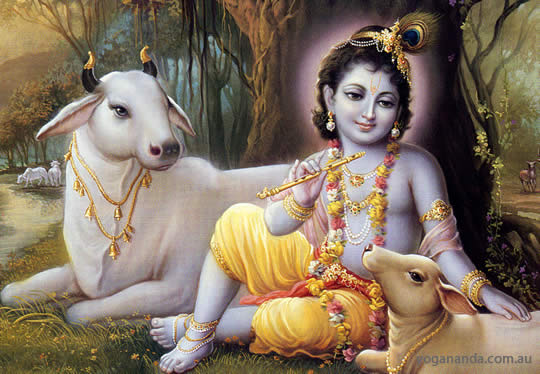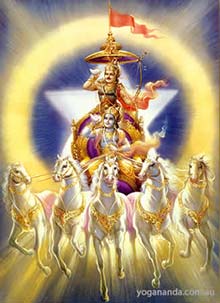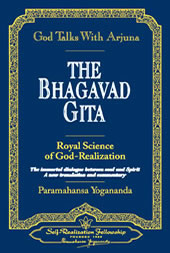Bhagavan Krishna
The Supreme Goal
He sees truly who perceive the Supreme Lord present equally in all creatures, the Imperishable amidst the perishing. He who is conscious of the omnipresence of God does not injure the Self by the self.
That man reaches the Supreme Goal.
—The Bhagavad Gita XIII:27-28 [—Commentary]
Birth of Bhagavan Krishna
Bhagavan Krishna, the eighth incarnation of the Hindu god Vishnu, lived in the third millennium before Christ. He was an Avatar or divine incarnation. The historical facts of Krishna's life are interwoven with a maze of legend and mythology.
Krishna (literally ' the Dark One' or 'Dark-blue' in reference to the deep bluish hue of his skin).
Devaki, mother of Krishna, was a cousin of Kamsa, the wicked king of Mathura (now Uttar Pradesh). It was predicted that the eight child of princess Devaki would kill Kamsa so he imprisoned her and killed six of her babies. The birth of seventh child was concealed.
The life of Lord Krishna has been misunderstood by many Western commentators. Scriptural allegory is baffling to literal minds. —Paramahansa Yogananda
Strange omens preceded the birth of Krishna. Flowers that had folded their petals at sundown bloomed again, filling the night air with sweet fragrance. Birds awoke and chirped joyfully. Peacocks spread their magnificent plumage and danced as clouds showered gentle rain on the parched earth. The prison cell was suffused with a soft glow of light as the baby was born.
Krishna, the eighth child of Devaki was born at the stroke of midnight on Ashtami in the month of Shravan (August-September). ('Ashtami' is the eighth day of the waning moon in each lunar month of the Hindu calendar.) Under cover of night Krishna was taken secretly out of the prison by his father Vasudeva to Gokula to his foster parents, Yasoda and Nanda.

Krishna grew up as a cowherd near Brindaban on the banks of the Yamuna River where he played with gopis (milkmaids) and especially Radha. That became later part of bhakti traditions. Bhakti, meaning devotion, stresses the union with God through intense love.
Krishna played the flute, especially at night. This symbolizes Krishna calling out to all souls who are lost in lila ('divine play') and samsara ('a flowing with' the phenomenal flux, the karmic wheel, that which is constantly changing, the cycle of birth and death).
As a young man, Krishna returned to Mathura, and overthrew and killed his uncle, Kamsa. He established his own Kingdom in Dwaraka (now Gujarat) and became a friend of Arjuna. Krishna married princess Rukmini who is also considered to be an avatar of Lakshmi, the goddess of fortune.
Janmashtami
Janmashtami celebrates the birth of Krishna on the eighth day (Ashtami) in the month of Shravan (August-September).
Janmashtami is celebrated with prayers and devotional chanting.
Bhagavan Krishna and Arjuna

Before the Kurukshetra war, both Arjuna and Duryodhana sought Krishna's assistance. Krishna offered them the opportunity to choose between having him (but on the condition that he personally would not fight) or having his army. Duryodhana, the leader of the Kauravs chose Krishna's army. Arjuna on behalf of the Pandavas chose to have Krishna, who became his charioteer and adviser.
After arriving at the battlefield Arjuna had serious doubts about fighting his cousins, his grandfather and family who were on the opposing side. Krishna then advises him about the battle. Krishna's discourse with Arjuna was later compiled as the Bhagavad Gita by the sage Vyasa. Thus Krishna helped the Pandavas win the Mahabharata war without personally using any physical weapon.
Similarities between Krishna and Jesus
Certain events surrounding birth of Krishna and early life are remarkably similar to those in the life of Jesus: a wicked uncle. King Kamsa destroyed many of Krishna's siblings in an effort to kill Krishna, but the babe was miraculously saved. Kamsa also had every infant in the neighbourhood killed. Krishna was raised in humble obscurity as a cowherd until he reached maturity and was ready to fulfil his mission on earth.
Jesus said, "Believest thou not that I am in the Father, and the Father in me? The words that I speak unto you I speak not of myself: but the Father that dwelleth in me, he doeth the works." (John 14:10). Three millenniums earlier the Divinity spoke within the form of Krishna,
"Whenever virtue declines and vice predominates,
I incarnate as an Avatar.
In visible form I appear to destroy evil and re-establish virtue" (Bhagavad-Gita IV: 7-8).
The Essence of the Bhagavad Gita - 21 best Krishna quotes
The Purpose of Krishna's Life
Bhagavan Krishna has played many different roles during His stay in the world. He was a cowherd. He was an ideal son, an ideal brother, an ideal husband, an ideal friend and an ideal king. He is the embodiment of all the highest ideals of man. But most of all Sri Krishna, Yogeshvar, 'Lord of Yoga,' taught the supreme truths of Yoga, Bhakti and Vedanta to Arjuna. The main purpose of Lord Krishna's birth was to free Earth from the wickedness and ignorance. The universal teachings of Lord Krishna have been written down in the Bhagvad Gita ('Song of God').
The End of the Incarnation of Lord Krishna
A hunter accidentally shot Krishna with the arrow. Lord Krishna's spirit left his body and rose into the spirit. Krishna said in the Bhagavad Gita:
This Self is never born nor does it ever perish;
nor having come into existence will it again cease to be.
It is birthless, eternal, changeless,
ever-same
(unaffected by the usual processes associated with time).
It is not slain when the body is killed.
(II:20)
The Bhagavad Gita
On the surface, Krishna's counsel is gloriously edifying in its simplicity and can shed light on the path of any man in any age or clime. A deeper study reveals the pathway to God-realization through yoga techniques of meditation and attunement with the cosmic laws of right action.
The path advocated by Bhagavan Krishna is the moderate, medium, golden path, both for the busy man of the world and for the highest spiritual aspirant.
In God Talks with Arjuna: The Bhagavad Gita Paramahansa Yogananda gives in-depth interpretation of all verses.
He who perceives Me everywhere
and beholds everything in Me
never loses sight of Me,
nor do I ever lose sight of him.
(The Bhagavad Gita VI:30)
![]()
